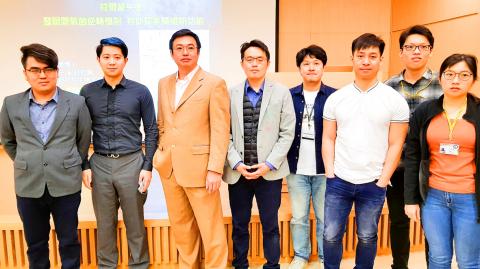The identification of a bacterium related to the retroconversion of sex steroids might lead to treatments for hormonal problems such as baldness and menopause, a team of researchers said yesterday.
Steroids turn androgens into sex hormones such as estrogens, a process that was once thought to be irreversible, but apparently can be turned back by specific anaerobes, Academia Sinica Biodiversity Research Center deputy director Chiang Yin-ru (江殷儒) told a news conference in Taipei.
The team has found an anaerobic bacterial strain — Denitratisoma sp. strain DHT3 — that can reverse the process, turning estrogen back into androgen via a process mediated by vitamin B12, or cobalamin, he said, adding that the strain was found in silt at a sewage treatment plant in Taipei.

Photo: Chien Hui-ju, Taipei Times
Through genome sequencing and protein experiments, the team found that the retroconversion of estrogen into androgen is related to bacteria containing a specific enzyme (methyltransferase) with a gene named emtA, whose operation and expression involve vitamin B12 and estrogen, he said.
As emtA also exists in the anaerobic environment of the human gut, the retroconversion of estrogen might also happen in humans, he added.
Studies have suggested — without knowing the bacterial players or mechanism involved — that gut microbiota could affect a host’s sex steroid profile, he said, adding that the team’s study sheds new light on the subject.
Specific hormones regulate the development and maintenance of male and female characteristics, and the team’s research signals potential new treatments for menopause, baldness and prostate cancers through probiotics, Chiang said.
The team is attempting to isolate and characterize the hormone-
transforming anaerobes to develop such probiotics, Chiang said, adding that he is collaborating with Chang Gung Memorial Hospital on experiments.
The team’s study, “Retroconversion of estrogens into androgens by bacteria via a cobalamin-mediated methylation,” was published in the journal Proceedings of the National Academy of Sciences on Jan. 21.
The lead author, Wang Po-hsiang (王柏翔), worked with Chiang at the research center and is now working at Japan’s Tokyo Institute of Technology.
National Taiwan University fisheries science professor Lee Tzong-huei (李宗徽) also contributed to the study.
The journal published a commentary on the team’s article, titled “Anaerobic bacteria need their vitamin B12 to digest estrogen,” a week later.

Tropical Storm Gaemi strengthened into a typhoon at 2pm yesterday, and could make landfall in Yilan County tomorrow, the Central Weather Administration (CWA) said yesterday. The agency was scheduled to issue a sea warning at 11:30pm yesterday, and could issue a land warning later today. Gaemi was moving north-northwest at 4kph, carrying maximum sustained winds near its center of up to 118.8kph and gusts of 154.8kph. The circumference is forecast to reach eastern Taiwan tomorrow morning, with the center making landfall in Yilan County later that night before departing from the north coast, CWA weather forecaster Kuan Shin-ping (官欣平) said yesterday. Uncertainty remains and

SEA WARNING LIKELY: The storm, named Gaemi, could become a moderate typhoon on Wednesday or Thursday, with the Taipei City Government preparing for flooding A tropical depression east of the Philippines developed into a tropical storm named Gaemi at 2pm yesterday, and was moving toward eastern Taiwan, the Central Weather Administration (CWA) said. Gaemi could begin to affect Taiwan proper on Tuesday, lasting until Friday, and could develop into a moderate typhoon on Wednesday or Thursday, it said. A sea warning for Gaemi could be issued as early as Tuesday morning, it added. Gaemi, the third tropical storm in the Pacific Ocean this typhoon season, is projected to begin moving northwest today, and be closest to Taiwan on Wednesday or Thursday, the agency said. Today, there would likely

DISRUPTIONS: The high-speed rail is to operate as normal, while several airlines either canceled flights or announced early departures or late arrivals Schools and offices in 15 cities and counties are to be closed today due to Typhoon Gaemi, local governments announced last night. The 15 are: Taipei, New Taipei City, Taoyuan, Tainan, Keelung, Hsinchu and Kaohsiung, as well as Yilan, Hualien, Hsinchu, Miaoli, Chiayi, Pingtung, Penghu and Lienchiang counties. People should brace for torrential rainfall brought by the storm, with its center forecast to make landfall on the east coast between tonight and tomorrow morning, the Central Weather Administration (CWA) said. The agency issued a sea warning for the typhoon at 11:30pm on Monday, followed by a land warning at 11:30am yesterday. As of

CASUALTY: A 70-year-old woman was killed by a falling tree in Kaohsiung as the premier warned all government agencies to remain on high alert for the next 24 hours Schools and offices nationwide are to be closed for a second day today as Typhoon Gaemi crosses over the nation, bringing torrential rain and whipping winds. Gaemi was forecast to make landfall late last night. From Tuesday night, its outer band brought substantial rainfall and strong winds to the nation. As of 6:15pm last night, the typhoon’s center was 20km southeast of Hualien County, Central Weather Administration (CWA) data showed. It was moving at 19kph and had a radius of 250km. As of 3pm yesterday, one woman had died, while 58 people were injured, the Central Emergency Operation Center said. The 70-year-old